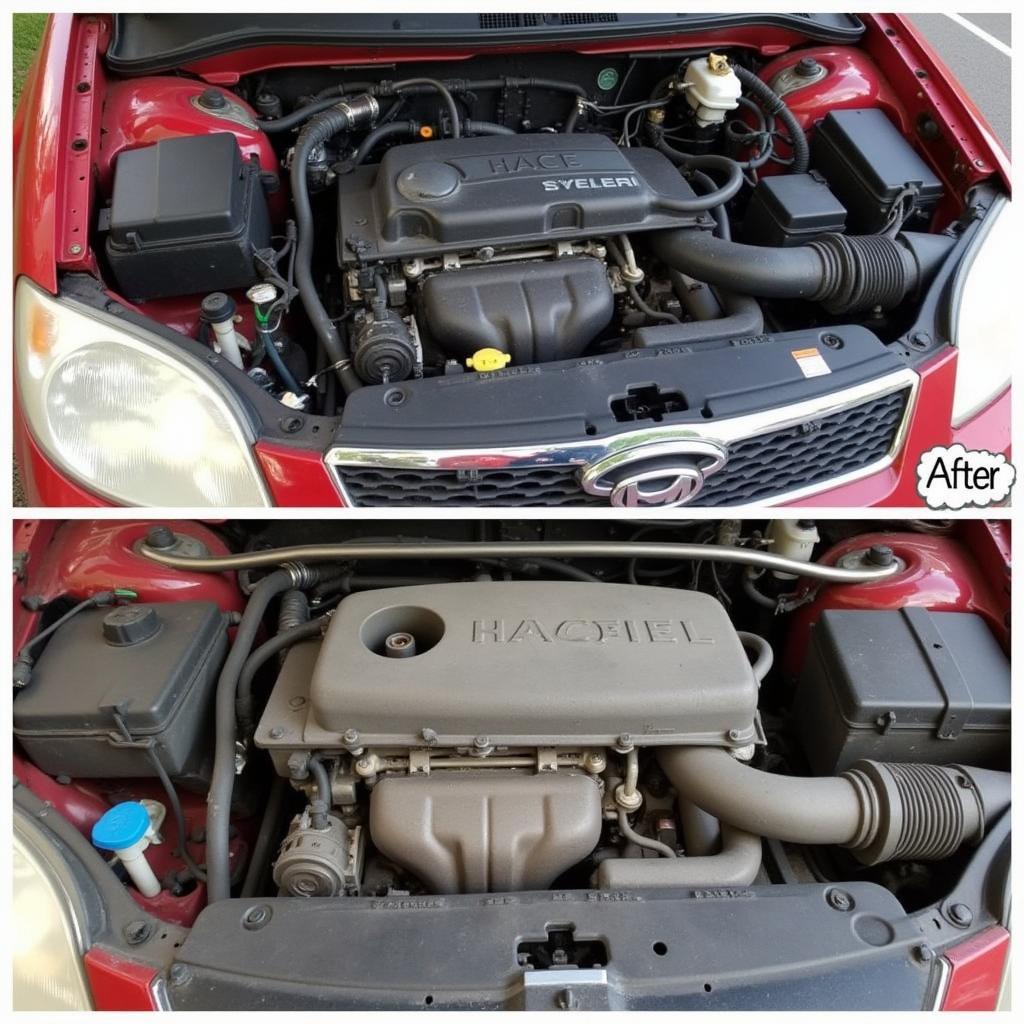Car Detailing Clean Engine Harm Vehicle? It’s a common concern. While a clean engine bay looks great, some worry about potential damage. This article dives deep into the process, dispelling myths and offering best practices for safe and effective engine cleaning. We’ll cover the risks, the rewards, and everything in between, helping you understand how to keep your engine sparkling without causing any harm.
Understanding the Risks and Rewards of Engine Bay Cleaning
Many car owners take pride in a gleaming engine bay, but the question remains: can car detailing clean engine harm vehicle components? The truth is, improper cleaning techniques can indeed cause problems. Water and certain cleaning products can damage sensitive electrical components, sensors, and wiring. Using high-pressure water jets can force water into areas where it shouldn’t be, leading to corrosion and malfunctions. However, with the right approach, a clean engine is not only aesthetically pleasing but can also improve performance and longevity. A clean engine allows for easier inspection of leaks and potential issues, and a cooler running engine thanks to better heat dissipation.  Engine Cleaning Risks and Rewards
Engine Cleaning Risks and Rewards
Why a Clean Engine Matters
Besides looking impressive, a clean engine offers several benefits. Removing grime build-up improves heat dissipation, helping your engine run cooler. It also makes it easier to spot leaks, cracks, or worn hoses, allowing for timely maintenance and preventing more serious issues. Moreover, a clean engine is less likely to attract rodents who might chew on wires, causing costly repairs. Just like car detailing in lincoln nebraska, a clean engine bay is a sign of a well-maintained vehicle.
Safe and Effective Engine Cleaning Techniques
So, how do you detail an engine without risking damage? The key is to use the right products and techniques. Avoid harsh degreasers and high-pressure washing. Instead, opt for gentle cleaning solutions specifically designed for engines. car detailing service zephyrhills fl often recommends using a low-pressure spray bottle and a variety of soft brushes to agitate and remove grime.
Step-by-Step Guide to Cleaning Your Engine Bay
- Preparation: Cover sensitive components like the alternator, air intake, and distributor with plastic bags and secure them with tape.
- Pre-Cleaning: Use a dry brush or compressed air to remove loose debris and leaves.
- Applying Degreaser: Spray the engine bay with an engine-specific degreaser, allowing it to dwell for the recommended time.
- Agitation: Use soft brushes and detailing tools to loosen grime and dirt.
- Rinsing: Rinse the engine bay with low-pressure water, avoiding direct spray on electrical components.
- Drying: Use compressed air and microfiber towels to dry the engine bay thoroughly.
- Protecting: Apply a dressing to protect engine components and enhance their appearance.
Debunking Common Myths About Engine Cleaning
There are several misconceptions surrounding engine cleaning. Some believe that water is the enemy of engines, while others think that any degreaser will do. The truth is, modern engines are designed to withstand some exposure to water. The danger lies in using excessive amounts of water or directing high-pressure streams at vulnerable areas. As for degreasers, using harsh chemicals can strip away essential oils and damage plastic and rubber components. car detailing towel can be useful in this process.
Will Water Damage My Engine?
No, not if used correctly. A controlled rinse with low-pressure water is perfectly safe. The key is to avoid soaking electrical components and ensure thorough drying afterwards.
“A clean engine is more than just aesthetics; it’s about preventative maintenance and extending the life of your vehicle,” says Kevin Miller, a seasoned automotive technician with over 20 years of experience. “Regular cleaning can prevent corrosion and make it easier to identify potential issues before they become major problems.”
Car Detailing Clean Engine Harm Vehicle: FAQs
Here are some frequently asked questions about engine cleaning:
-
How often should I clean my engine? It depends on your driving conditions. If you frequently drive on dusty or muddy roads, you may need to clean your engine more often. Generally, cleaning every 6-12 months is sufficient.
-
Can I use a pressure washer? It’s best to avoid high-pressure washers. They can force water into sensitive areas and cause damage.
-
What type of degreaser should I use? Always use a degreaser specifically formulated for engines. Avoid harsh chemicals that can damage plastic and rubber components. You can find quality products at reputable car detail columbia shops.
-
What if I get water in the electrical components? If water gets into electrical components, dry them thoroughly as soon as possible with compressed air and a clean microfiber towel.
-
Is it worth paying for a professional engine cleaning? If you’re not comfortable cleaning your own engine, it’s best to leave it to the professionals. They have the expertise and equipment to do it safely and effectively. car details sri lanka also offer professional engine detailing.
-
Can engine cleaning improve fuel efficiency? While not directly related to fuel economy, a clean engine allows for better heat dissipation, potentially contributing to optimal engine performance.
-
What are some signs that my engine needs cleaning? Excessive grime build-up, difficulty identifying components due to dirt, or a noticeable smell of burnt oil are all indicators that your engine bay could benefit from a cleaning.
Conclusion
So, can car detailing clean engine harm vehicle? While improper techniques can pose risks, a careful and informed approach to engine cleaning offers significant benefits. By following the guidelines outlined in this article, you can maintain a sparkling engine bay without jeopardizing the health of your vehicle. Regular cleaning combined with proper maintenance will ensure your engine runs smoothly and efficiently for years to come.
Need further assistance with your car detailing needs? Contact us via WhatsApp: +1(641)206-8880 or Email: [email protected]. Our 24/7 customer service team is ready to help.

Leave a Reply